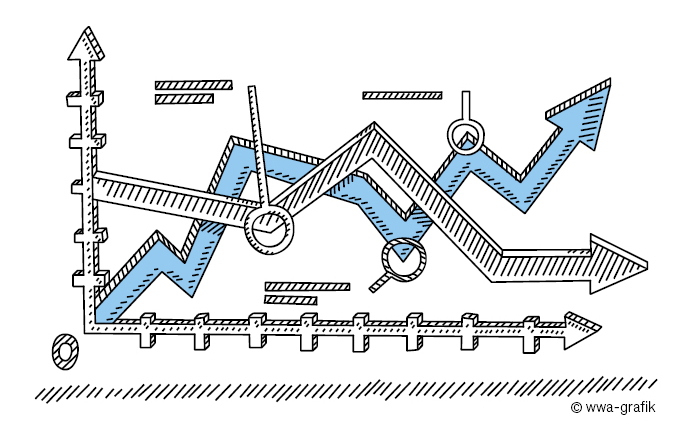Which topics does the Economics programme cover?
Economics deals with the interrelationships of the economic activity of a whole society. For example, if social or structural problems are identified, the state can intervene with economic policy measures based on this knowledge (Does a minimum wage prevent people from earning enough to live off their jobs?) Economics comprises two levels: In microeconomics, the activities of economic units (individuals or enterprises as a whole) are analysed (Why is a product sold in a specific quantity at a specific price? What happens when demand for this product increases?). Macroeconomics, on the other hand, scrutinizes the sum of economic processes in a society (Under what conditions does the economy grow? Can the economy grow endlessly?).

By contrast, business administration does not analyse the economic activity of a whole society but instead economic activity economics at corporate level. The aim is to understand corporate processes and structures and identify possible connections. This allows a company to make sound decisions, for example on how to optimise its processes and procedures. In this context, business administration deals both with fundamental corporate issues which apply to all organisations and functions (How do companies work in general and what different possibilities are there to structure these companies?) as well as with individual types of business undertaking (How does a bank work and what does this mean for its organisational structure?) as well as with specific corporate functions (Which corporate structure is best for which situation?).
What will I learn in the basic studies programme?
Mathematics
For economics, mathematics is a kind of language or structure with which its problems can be described in numbers and examined in the abstract. For this, you will need to be able to master mathematical equations in a professional manner. This means that apart from repeating what you learnt in your last years at school, you will expand your knowledge of mathematics to include new topics such as matrix algebra as well as differential and integral calculus in several variables. By contrast to school, you will work less with concrete figures. Since problems are often tackled by means of examples, these are mostly presented as generally applicable equations (using variables, placeholders, letters) into which only sometimes numbers from a specific case are inserted. The standard is therefore a little higher than at school. Basic maths skills (For example: Fractions, solving equations, differential and integral calculus) as well as the ability for logical and abstract thinking are expected.
These courses form the basic foundation for successful participation in all further courses in the Economics programme. If you are unable to master these tools, you will not be able to cope with more advanced courses later on.
Statistics
Originally, what was understood by statistics was solely official statistics, for example like they already appeared in the census in the Christmas story. In modern terms, however, statistics is not only the simple counting of people, things or events. Statistics rather more teaches us how to handle countable information in general and is therefore not only applied to economics questions. In the statistics courses, you will learn methods for describing data (descriptive statistics: creating a table or a diagram), recognize existing commonalities or variances in data (explorative statistics: Is there a measurable correlation between the procurement of various products?) and deduce information on specific groups from other groups (inductive statistics: If in Supermarket A toothbrushes and toothpaste are mostly bought together, then we can deduce that the same applies for Supermarket B).
You will need these statistics skills - just as well as the topics covered in the mathematics courses - in order to be able to keep up throughout the rest of the programme. Students wishing to specialise in Quantitative Economics or Financial Economics should find these concepts easy.
Fundamentals of Economic Theory
Theories are used to explain fundamental economics interrelationships. These are presented in simplified form using models. How do we make decisions? How do we interact in an economics context? What makes economic exchanges (trade) so interesting? All these are questions with which you will deal from both a microeconomics and macroeconomics perspective. Macroeconomics deals with questions concerning aggregated indices: What causes economic growth or recession? What influences inflation? Why are unemployment figures higher in the winter than in the summer? Why are some countries richer than others? Microeconomics centres on supply and demand for certain goods as well as prices and quantities: What makes a company choose a specific production process (e.g. more workers, less machines)? How much of a product must a company manufacture and with which production process and how high must the price be set in order for it to make as high a profit as possible?
In this module, you will learn about fundamental economics theories, approaches and potential solutions which you will also encounter in the lectures on economics and finance in the further course of your studies. Those students wishing to choose Quantitative Economics, Financial Economics or Psychoeconomics as their area of specialisation should pay special attention.
Economic Policy
What is understood by economic policy is measures taken by the state to regulate and co-shape the (otherwise free) economy. Economic policy analysis is therefore possible from two perspectives: Normative economics asks what the state must do in order to meet a specific objective (e.g. a more just distribution of assets). Positive economics, on the other hand, deals with the impact of state action. What can the state do so that all available assets (such as clean air) are not used (in this case polluted) disproportionately by certain groups of individuals? What happens if the state charges tuition fees or abolishes them again? As the last question already makes clear, state revenue (especially taxes) and expenditure as well as deliberations about on what money should be spent or how it should be distributed among the people play a particularly important role here. That is why you will deal with these topics in depth in the Public Finance I course.
This module is especially useful for an analysis of economic systems and economic policy in general. What you learn will not only make it easier for you to read the newspaper but also familiarise you with how to apply economics theories in practice.
Fundamentals of Business Administration I
This module covers three areas of functional business administration. In the framework of the lecture on corporate accounting (cash flow and flow of goods expressed in figures), you will first learn the difference between internal and external accounting. After you have dealt with external accounting (financial reporting) in depth within the course, you will know, amongst others, what you need to take into consideration with regard to financial reporting according to Germany’s Commercial Code, are able to interpret corporate balance sheets and can calculate by yourself indicators with which to assess a company. The course on Organizational Theory and Design is devoted to the topic of organisational forms: What characterises an organisation? What alternative types of corporate structure are there? How does the way a company or organisation is structured impact on staff motivation? The course ends with an introduction to Marketing. Apart from defining different markets, you will deal, for example, with questions such as what is understood by marketing management or what needs taking into consideration when implementing specific marketing measures.
The indicators presented in this module are relevant both for the analysis of corporate entities as well as for a better understanding of business news. What you have learnt is applied in practice above all in the areas of specialisation of Economics and Business Education as well as Applied Economics.
Fundamentals of Business Administration II
In the Business Administration II module, you will now deal with accounting in accordance with the International Financial Reporting Standards (IFRS) and learn to what extent this method differs from accounting in compliance with Germany’s Commercial Code. In the second part of this module, you will deal with financial decisions in the framework of corporate finance (Should I build a property or buy shares?) You will analyse various investment projects (What influence do taxes, inflation or interest rates have?), familiarise yourself with the capital markets and learn how to assess corporate capital structures.
Most of you will come in contact with financial concepts again in the Investment and Finance course. If you want to study financial economics in greater depth, you ought to enjoy these topics.
External Page
To view this content (source: www.xyz.de ), please click on Accept. We would like to point out that by accepting this iframe, data could be transmitted to third parties or cookies may be stored.
You can find more information on our privacy policy .
Advanced studies
In general, you will choose an area of specialisation after your second or third semester .
External Page
To view this content (source: www.xyz.de ), please click on Accept. We would like to point out that by accepting this iframe, data could be transmitted to third parties or cookies may be stored.
You can find more information on our privacy policy .
Answers to Frequently Asked Questions
When do I have to choose an area of specialisation?
You will normally make your choice after your second or third subject-related semester.
How do I sign up for an area of specialisation?
You choose your area of specialisation at the point in time when you register for your first lecture outside the basic studies programme.
Change I switch from one area of specialisation to another?
Yes, you can do this once. To do so, please send an informal application to the Standing Examination Committee (via the departmental student advisory service).
When can I sit the exams in an area of specialisation?
Once you have completed all parts of the orientation test (Maths I and II, Introduction to Economics, Microeconomics).
Study plans - new examination regulations (2015)
- Vertiefungsrichtung_A.pdf (PDF, 50 KB)
- Vertiefungsrichtung_B.pdf (PDF, 48 KB)
- Vertiefungsrichtung_B_ab_WS_19-20.pdf (PDF, 100 KB)
- Vertiefungsrichtung_C.pdf (PDF, 15 KB)
- Vertiefungsrichtung_C_ab_WS_19-20_01.pdf (PDF, 106 KB)
- Vertiefungsrichtung_C_ab_WS_19-20_02.pdf (PDF, 107 KB)
- Vertiefungsrichtung_D.pdf (PDF, 48 KB)
- Vertiefungsrichtung_E.pdf (PDF, 48 KB)
- Vertiefungsrichtung_E_Psychooekonomik_-_Sozialpsychologie.pdf (PDF, 101 KB)
- Vertiefungsrichtung_F.pdf (PDF, 49 KB)

